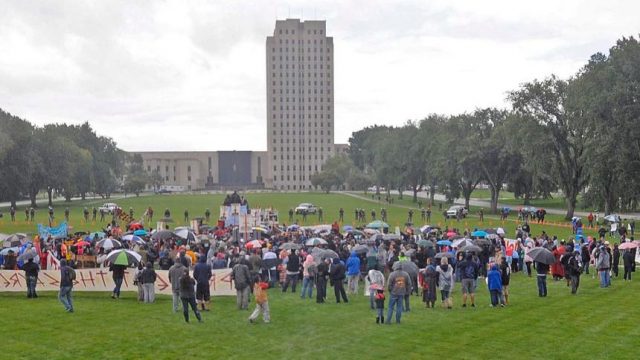Blame Standing Rock and #NoDAPL for North Dakota Legislature Cancelling Tribal Address UPDATED: Plan B Instituted

Updates to this story below
Next year North Dakota’s Legislature, including those members just elected earlier this month, will convene for their 2017 session. Typically each new session begins with a series of addresses from the governor, the judiciary, and the state’s tribes.
But this year the addresses from the tribes and the judiciary has been canceled.
“Native American tribal leaders’ biennial address to the North Dakota Legislature will not happen in 2017, a committee said Thursday in deciding to forgo formal events at the state Capitol due to security reasons involving the Dakota Access pipeline protests,” the Associated Press reports.
Legislative Management, which concluded meetings in Bismarck today, voted 10-3 to cancel the judicial and tribal addresses, though the address from the governor remains as it is required by law.
[mks_pullquote align=”right” width=”300″ size=”24″ bg_color=”#ffffff” txt_color=”#000000″]Archambault and the Standing Rock tribe have seriously harmed the tribal relationships with the State of North Dakota by partnering with environmental extremists to wreak havoc in south central North Dakota.[/mks_pullquote]
The reason for the cancellations? The antics of the #NoDAPL movement.
“We’re trying to be proactive,” House Majority Al Carlson said of the decision. “In no way is this infringing on anyone’s First Amendment rights. History shows up in recent months that we need to be cautious.”
It’s unfortunate that this is happening, but the blame for it lays squarely with the decisions made by the Standing Rock Sioux Tribe.
The #NoDAPL movement has been violent and unlawful, and unfortunately endorsed in an official capacity by the Standing Rock Sioux Tribe.
Tribal leadership, up to and including Chairman David Archambault, has largely refused to condemn the more extreme and violent factions of the protest movement. If often seems as though Archambault and others are even willing to admit that the violence is actually happening. While the Standing Rock council voted earlier this month to expel the so-called Red Warrior faction the protest camps, the unlawful and dangerous protests continue. Earlier this week #NoDAPL protesters tried to block railroad tracks with a burning truck.
While the Legislature must strive to keep open lines of communication to our state’s reservation communities, they are under no obligation to invite a circus of disrespectful protesters into their chambers.
Archambault and the Standing Rock tribe have seriously harmed the tribal relationships with the State of North Dakota by partnering with environmental extremists to wreak havoc in south central North Dakota. Maybe, when the tribe gets back to respecting their neighbors again, they’ll have an opportunity to address the Legislature.
UPDATE: Turtle Mountain Tribal Chairman Richard McCloud suggests that North Dakota’s tribes ought not be punished for the actions of out of state activists:
McCloud said most of the protesters who have been arrested since demonstrations escalated in mid-August near the Standing Rock Sioux Reservation are from other states.
“Unfortunately, it seems like North Dakota tribes are going to have to suffer the cost,” he said. “I’m disappointed. I’m hurt as a tribal leader for Turtle Mountain.”
The problem is that Standing Rock specifically invited these activists. Standing Rock partnered with Earthjustice, a far-left extremist group. And when these activists have rioted, have committed acts of violence and trespass and vandalism, who has been reticent to condemn them?
North Dakota’s tribal leaders.
They made their bed. Now they’re going to lay in it.
UPDATE: Scott Davis, North Dakota’s Indian Affairs Commissioner and member of the Standing Rock Sioux Tribe, called me this evening with an update.
He said that instead of the tribal address, legislative leadership in the House and Senate chambers would instead sit down individually with tribal leaders, something Davis says might actually be an improvement over the traditional speech to the entire legislative body.
Davis says the one-on-one meetings would allow tribal leaders to drill down into more specific issues.




